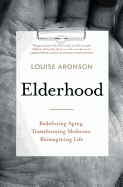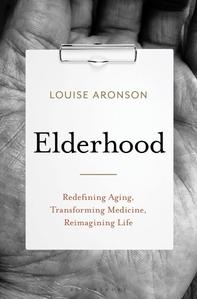
 For many, old age is a far-off concern shuffled to the back of their minds, where it distorts under the societal obsession with youth and beauty. For Louise Aronson, thoroughly accomplished in both the medical (American Geriatrics Society Geriatrician of the Year) and literary (A History of the Present Illness) fields, aging and the elderly are her passion. In Elderhood: Redefining Aging, Transforming Medicine, Reimagining Life, she gathers roughly three decades of case histories, criticism, curiosity and wisdom to offer readers a holistic, compassionate understanding of the third stage of life: elderhood.
For many, old age is a far-off concern shuffled to the back of their minds, where it distorts under the societal obsession with youth and beauty. For Louise Aronson, thoroughly accomplished in both the medical (American Geriatrics Society Geriatrician of the Year) and literary (A History of the Present Illness) fields, aging and the elderly are her passion. In Elderhood: Redefining Aging, Transforming Medicine, Reimagining Life, she gathers roughly three decades of case histories, criticism, curiosity and wisdom to offer readers a holistic, compassionate understanding of the third stage of life: elderhood.
From the beginning, Aronson is quick to point out how limited the dominant cultural understanding of old age is, as it distinguishes between the "successful aging" of some while bemoaning the illness and disability of others. She exposes the default of ageism time and again in her meticulous consideration of medical and family networks, political policy, municipal oversights, capitalist ambition and nearly every other sector of life that comes in contact with (or at the expense of) the elderly. Which is to say, society as a whole.
Older bodies aren't simply longer-lived versions of younger ones, just as adult bodies aren't simply bigger versions of children's. In Aronson's paradigm, each stage of life (childhood, adulthood, elderhood) requires a certain style of attention key to a person's quality of living, but the medical system regularly fails its oldest and most fragile patients by treating them in accordance with standards set by younger, whiter, straighter and maler norms.
Elderhood, like the life station it studies, is dynamic, multifaceted and full of wonder. Aronson's writing, too, flexes with vibrant energy as she discusses in lucid, candid detail the ways she has seen the healthcare system neglect the overall well-being of her patients, her colleagues and herself.
"When health care organizations proclaim value-based patient care is their top priority but institute productivity metrics that prioritize numbers of patients seen over whether those patients' needs are met, when they adopt electronic record systems that undermine the doctor-patient relationship, when their clinicians experience record levels of burnout and work dissatisfaction and they do nothing to alter the fundamental mechanics of daily life in their hospitals and clinics, an Orwellian story unfolds in the imaginations of patients and doctors alike."
Mixing empathy for the whole person and fury toward the systems that undermine that, Aronson draws on published studies and scientific data, as well as numerous literary sources (Rebecca Solnit, Vivian Gornick, Oliver Sacks, Bill Hayes et al.) to craft this monumental book. Intimidating as it may seem, elderhood becomes welcoming and generous in Aronson's deft care. --Dave Wheeler, associate editor, Shelf Awareness
Shelf Talker: A seasoned geriatrician gathers anecdotes and data to craft a more robust representation of what it means to grow old in a society geared toward ageism.

